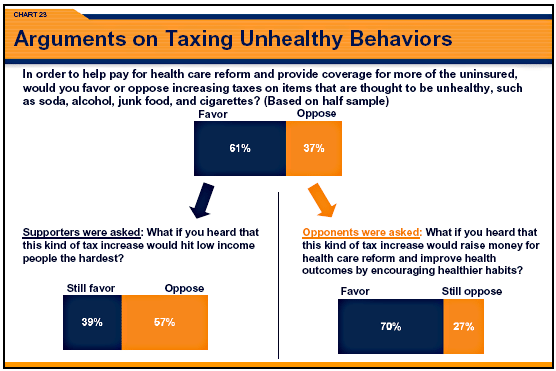Ezra Klein points to an intriguing bit of opinion polling from the Kaiser Family Foundation today: 61% of Americans say that in order to fund healthcare reform they’d support higher taxes on “items that are thought to be unhealthy, such as soda, alcohol, junk food, and cigarettes”:
Problematically, the poll question lumps a lot of different policies together. Paying for health care by taxing cigarettes is actually a common strategy. It’s how we funded S-CHIP, for one. Taxing soda is rather further from the center of the consensus. But there’s no evidence, in this poll at least, that the public instinctually recoils from the idea.
In a sense, I’m not too surprised by this. I suspect that most people know that soda and junk food really are a scourge and would like to cut back. So either through guilt, or maybe a sense that they need someone else to prod them into doing the right thing, they support higher taxes on this stuff.
Further down, however, there’s a followup question:

This is a fascinating example of just how thin opinion polling like this is. The real lesson here is that most people haven’t given this issue even a few seconds thought, and their response to the poll question is practically meaningless. Faced with even the slightest pushback, large majorities of both supporters and opponents flipped their views almost instantly.
So the real question isn’t how people feel about taxing junk food now, it’s how they’re likely to feel about taxing junk food after hearing both sides screech about it for a few days or weeks or months. This is true of most other opinion polling too. Caveat emptor.

















